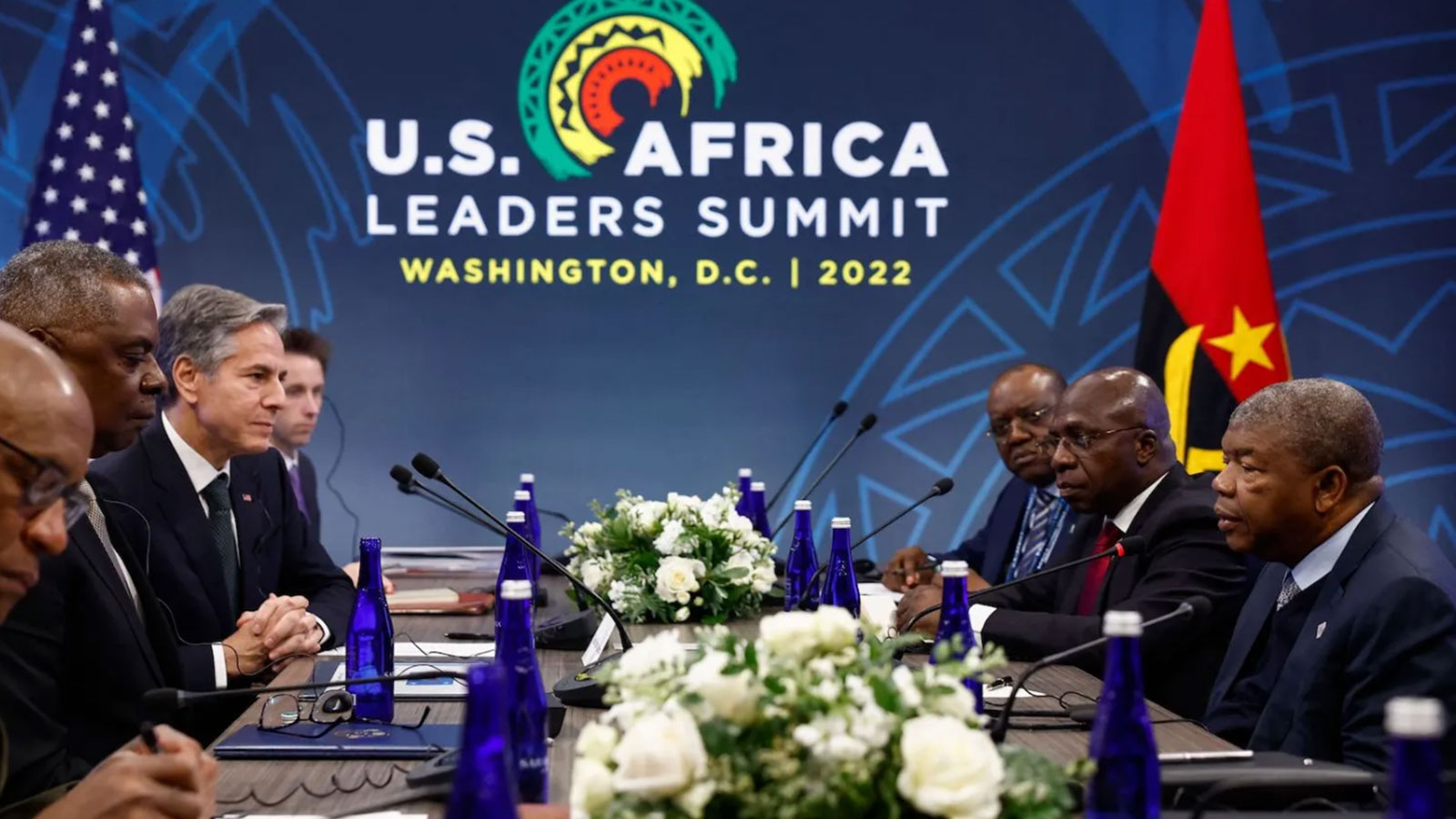A summit offers the Biden administration a chance to compete with rivals, while testing its commitment to democratic values.
By Nosmot Gbadamosi, Foreign Policy —
The United States Is Back in Africa
Washington welcomed nearly 50 African heads of state and officials yesterday to the second U.S.-Africa Leaders Summit.
The White House revealed ahead of the meetings that U.S. President Joe Biden would announce support for the African Union to become a permanent member of the G-20, a move that African Union chair and Senegalese President Macky Sall advocated at the U.N. General Assembly earlier this year. South African President Cyril Ramaphosa has also voiced support for the African Union’s addition.
As the only African member within the G-20, South Africa is now the continent’s third-largest economy after Nigeria and Egypt. The addition of the African Union, African leaders contend, would be an important correction in recognizing the continent’s global voice and influence.
Trade for influence. Top of the agenda at the U.S.-Africa Leaders Summit is economic engagement. It comes at an opportune moment for U.S. diplomats as Russia’s economy turns inward due to the fallout from the war with Ukraine and China’s global trade contracts as a result of its zero-COVID policy, prompting a reversal in its role as the biggest financial player on the continent.
It has been eight years since former U.S. President Barack Obama hosted the first summit with the continent in 2014, and the United States has lost ground since then, with China, the European Union, Turkey, France, and Japan hosting similar summits on a regular basis.
The problem for Washington is that while the U.S. government sees itself as a firm African partner, U.S. support has focused largely on the security sector and less visible improvements in global health such as family planning and HIV/AIDS programs, compared with the inescapable large-scale infrastructure developments offered by China.
The United States may have provided military hardware, but in Africans’ daily lives, the mobile phones used, the televisions watched, and the roads driven on are built by China. U.S. policymakers have been slow to adjust to that tricky conundrum. The mega-railways and houses of parliament that China builds in Africa are seen by many locals, and images of them are widely shared on social media. China has built or renovated at least 186 government buildings in Africa.
“We are not interested in having tens of thousands of our workers coming to Africa and building the infrastructure,” Don Graves, U.S. deputy secretary of commerce, told Foreign Policy without mentioning China. “We would much rather have our companies engaged and build the knowledge and capacity on the continent.”
Yet, the summit taking place in Washington is paving a significant path in U.S.-Africa relations that is more in line with African leaders’ wish lists. African leaders want the United States to collaborate on energy and infrastructure investments and lecture them less on cooperating with Russia and China.
“We as a country in the U.S. have not done enough to take advantage of the strengths of our relationship; for example, we have the largest African diaspora in the world,” Graves said. “At the end of the day, if the United States doesn’t show up, if we aren’t engaged, that doesn’t leave African nations—and especially the private sector—with choices that they could have.”
Young workforce. Africa has the youngest and fastest-growing population in the world, which should in some ways benefit its economy by creating a ready workforce for manufacturing exports. Yet governments have not always created the environment needed for such a workforce through investments and infrastructure.
Despite being home to almost 17 percent of the world’s population, Africa accounts for just 2.7 percent of global trade. It is estimated that at least 20 million jobs per year need to be created on the continent to keep the rate of employment constant. African leaders in part aim to address some of those shortfalls through the African Continental Free Trade Area (AfCFTA)—a pact that could stimulate investment and economic growth by doing away with some barriers to trade such as high tariffs on imports between African countries.
The United States has a “strong competitive advantage” on several key issues that are critical to Africa’s future in terms of commerce, trade, and accountable governance, Landry Signé, a Brookings Institution senior fellow, noted in Foreign Policy last year. “Despite the immense potential of U.S.-Africa relations, China has been more engaged with the continent,” with U.S. relations undermined in part by student visa restrictions and a refusal to engage at a high level, Signé wrote.
U.S. trade policies in Africa have tended to be fleeting because they are tied to ever-changing administrations, in comparison to China’s Belt and Road Initiative, which has remained a constant. Prosper Africa, created by former President Donald Trump in 2019, aimed to double trade and investment between the United States and Africa. It has so far helped close around 1,100 export and investment deals across 49 African countries with an estimated value of $65 billion, while Power Africa, a $7 billion initiative launched in 2013 under Obama, sought to improve Africa’s energy access.
Meanwhile, China’s total bilateral trade rose to $254 billion in 2021, with foreign direct investment stocks of $43.4 billion in 2020. In contrast, U.S.-Africa trade fell to just $64.3 billion in 2021. Working closely with Congress, the United States is expected to commit about $55 billion to Africa over the course of the next three years.
At the core of the three-day summit is a “deal room” where U.S. and African officials can help close commercial agreements—the focus of which will be on infrastructure, health care, digital connectivity, and helping small- to medium-sized businesses, Graves told FP.
Overall, there is an opportunity for both U.S. and African officials to think outside the box when it comes to investment rather than focusing only on energy and manufacturing industries—and looking instead to nurture talent within Africa’s emerging technology and culture sectors.
In Nigeria, Africa’s most populous country and largest economy, the creative sector is fueled by a population in which the median age is just 18. This sector contributed about $18 billion to the country’s GDP in 2020 alone, according to the World Bank. In South Africa, video gaming and esports earned a revenue of $290 million in 2021, and they earned $185 million in Nigeria. How can U.S. companies further support and? More importantly, U.S. officials should keep in mind that African leaders’ wishes do not always align with the demands or capabilities of their young citizens.
A key demand among Africa’s young people is true democracy. The fact that the world’s longest-serving autocrat, Equatorial Guinea President Teodoro Obiang, will be attending the summit in Washington doesn’t help on that front.
As FP’s Robbie Gramer, Amy Mackinnon, and Jack Detsch write, the United States has been diplomatically engaged with Obiang in a bid to prevent China from establishing a naval base in Equatorial Guinea, but it comes at the expense of the Biden administration’s global democracy and human rights agenda. Across 30 countries, a large majority of citizens are opposed to one-man rule (82 percent) and favor presidential term limits (77 percent), according to Afrobarometer.
Source: Foreign Policy
Featured image: Ndambi Guebuza, son of former Mozambique President Armando Guebuza, is seen during court proceedings at the Maputo Central Prison in Maputo, Mozambique, on Nov. 30. (Evelyn Hockstein/Pool/AFP via Getty Images)















